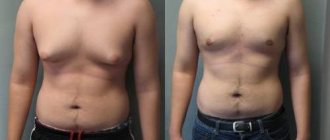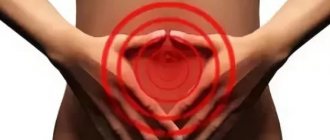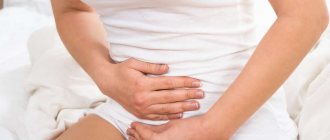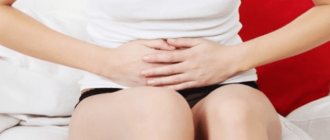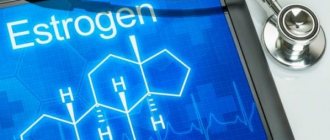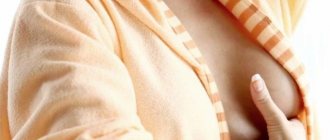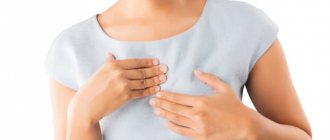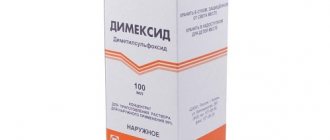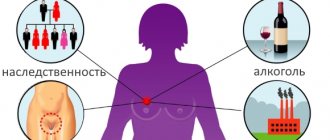Processes occurring in the middle of the cycle
Normally, the cycle length is 28 days. Ovulation begins in the middle of the cycle. The moment of ovulation may vary depending on the individual characteristics of the body. Today, to determine “day X,” there are calendar-type applications that make calculations from the moment of ovulation.
Typically, changes in the mammary glands are observed precisely in the middle of the cycle. Such changes are explained by hormonal fluctuations due to the egg being ripe for fertilization. In the first two weeks of the cycle, prolactin and estrogens dominate in the body, which have a serious effect on the organs of the reproductive system. These hormones are responsible for the process of pregnancy.
The middle of the cycle is characterized by a hormonal maximum, due to which glandular tissues grow. If conception does not occur during this period, the tissues are restored to their original state, and painful sensations go away.
Other causes of breast tenderness
The mammary glands can constantly hurt due to wearing the wrong underwear, compression or microtrauma.
The breasts also begin to hurt in the first weeks of pregnancy, when the production of prolactin and estrogen increases due to the active preparation of the body for bearing and subsequent feeding of the child. By 10 weeks, the discomfort disappears.
Breast tenderness is an alarming symptom. If you doubt that pain is part of premenstrual syndrome, you should consult a doctor. It is not recommended to postpone a visit to a specialist if, in addition to the pain symptom, you observe other changes in the body’s functioning. Most diseases are easier to overcome at the beginning of their development than at a later stage. For this reason, regular examinations by a mammologist and gynecologist will never be superfluous.
Causes of pain
When considering the reasons why breasts hurt in the middle of the cycle, it is necessary to take into account the factors that influence this condition. The chest begins to hurt for several main reasons:
- Due to hormonal changes, the mammary glands swell and the breasts begin to hurt. A decrease or increase in the amount of hormones causes pain, and negative consequences can be observed. If a woman experiences severe pain, attacks of weakness, deterioration in health, unnatural discharge from the mammary glands, or decreased hair growth, she should definitely consult with her doctor. Medications are usually required to regulate hormonal levels.
- Excess fluid can accumulate not only in the limbs, but also in the chest, which can cause it to become very sore. A woman feels spasms and tingling in the mammary glands. This condition occurs due to excess salt consumption, poor diet, abuse of alcohol, tobacco products, and carbonated drinks. You should also pay attention to the size of the underwear. A bra that compresses the lymphatic vessels interferes with the outflow of fluid. As a result, the chest aches and the vascular network appears.
- An increase in breast sensitivity may indicate the onset of ovulation. It occurs at the beginning of the third week of the cycle. The woman feels discomfort, weak, nagging pain. Nipples are the most sensitive area of the breast; any changes clearly affect their condition. Pain in the nipples occurs for the same reasons as in the chest. The nipple area contains a large number of nerve endings. Some women, with the onset of ovulation, experience increased sensitivity in their nipples, but the condition of their breasts remains unchanged.
Pain and discomfort may occur for other reasons and may be cyclical or periodic. Pain may occur due to:
- Pregnancy - the mammary glands prepare to feed the unborn child.
- Infectious, colds - the presence of cracks in the nipples increases the likelihood of infection. The woman feels extreme pain.
- "False" pregnancy. This state depends on the psycho-emotional sphere of the woman - she waits for the manifestation of minimal signs of pregnancy. Even symptoms of toxicosis often appear.
- The use of sedative medications changes the level of hormone production.
- Even minimal damage to the chest area causes discomfort, pain, and possibly swelling of the mammary glands.
- An unbalanced diet negatively affects the health of the body as a whole and the condition of the mammary glands.
- Menopause – pain occurs due to serious hormonal changes.
- Stress and depression cause disruptions in the functioning of the endocrine system, which is responsible for the production of hormones.
Chest pain during menstruation and pregnancy
Breast pain is a normal reaction of the body during menstruation and gestation due to changes in a woman’s hormonal background. The same change in the level of estrogen, prolactin and progesterone can provoke the appearance of pain in the chest area during these periods. And if during menstruation, to relieve pain, you can take analgesics, then during pregnancy this technique is not suitable, since any painkillers can harm the fetus. In this case, a warm compress and a comfortable, soft bra will help. You can also use a special ointment, the use of which must be prescribed by a doctor.
Possible diseases
The question of why breasts hurt between periods cannot be given an exact answer. It all depends on the individual characteristics of the body, and pain does not necessarily have a pathological origin. If any symptoms appear, it is better to visit your doctor for diagnosis.
Pain in the mammary glands may indicate the following conditions:
- Mastitis is an infection that enters the body through the milk ducts. Accompanied by inflammation and stagnation of milk. The lack of adequate therapy leads to complete damage to the glands.
- Mastalgia - can be found more often in adolescents, extremely rarely in women. Causes severe, long-lasting pain and is a precursor to the formation of malignant tumors.
- Oncological pathologies. Breast cancer is considered the most dangerous and common. The pathology has an extremely low survival rate.
- Mastopathy - appears as a consequence of hormonal imbalance, which provokes the development of benign tumors. Pain occurs throughout the menstrual cycle.
- Mastodonia – characterized by nagging, cutting pain, breast engorgement. During the first period of menstruation, the thoracic ducts expand, then under the influence of progesterone they are restored to their normal state. Progesterone deficiency does not allow the ducts to narrow, causing the mammary glands to stretch out and cause pain.
Other possible causes of breast swelling in the middle of the menstrual cycle
These include those reasons when breast tenderness during and after ovulation is not associated with physiological ovulatory processes and the period of early pregnancy.
In this case, the following pathological disorders are possible:
- Mastopathy. Mastopathy occurs when there is a hormonal imbalance. It is benign in nature and is accompanied by thickening of the mammary gland. The chest hurts at any time after ovulation.
- Hormonal changes in the body. It can be caused by hormonal imbalances within a woman’s body. The reasons for the appearance of such a disorder in the middle of the menstrual cycle are the use of contraceptives, sexually transmitted infections, tumor growth, menopause, parasites, infection of the mammary gland, heredity, experiences and stress.
- Mechanical damage. Occurs when there is strong compression of the mammary gland. After such injury, you can notice that only one mammary gland is swollen. This may be due to the fact that at the time of the impact only the right side was damaged.
- Oncological neoplasms. May cause pain in the chest after menstruation. The earlier it is recognized, the greater the chance of defeating the tumor-like neoplasm.
- Menopause.
- Taking sedative medications.
- Constant presence of stress and depression.
- Binge eating.
- Other reasons. Chest pain can also be associated with diseases of the genitourinary tract, arthritis, pneumonia, and osteochondrosis.
- Mastalgia. If the pain is prolonged, it may be mastalgia. More often it occurs in adolescence during puberty, when breasts develop. In adulthood, the disease has a detrimental effect on a woman’s activity and personal life.
To prevent the development of complications in this case, you should definitely consult a doctor. The doctor will perform a manual examination of the breast and axillary lymph nodes. Women under 40 years of age are prescribed an ultrasound of the mammary glands; women over 40 years of age should be recommended by a doctor to undergo a mammogram.
Additionally, if several lumps are detected in the mammary gland, a biopsy or sonogram is prescribed.
Dangerous symptoms
Not every woman knows in what cases she needs to seek help if her mammary glands hurt. Taking into account the characteristics of the body, some girls understand when breasts hurt for natural reasons, and in what cases help is needed.
Symptoms that require you to see a doctor:
- the appearance of lumps in the chest;
- headaches, fatigue, insomnia;
- vomiting, nausea;
- swelling, heaviness of the breast;
- hardened nipples, entire breasts;
- severe pain of a pulling, cutting nature;
- excessive swelling of the glands;
- prolonged pain;
- increased emotionality, irritability.
What to do if two or one mammary gland is swollen?
At home, you can relieve chest pain during or after ovulation by:
- wear comfortable underwear made of natural fabric, without wires, with wide straps;
- do wet wipes;
- perform air baths;
- perform special exercises.
If in the middle of the menstrual cycle after ovulation or in the early stages of pregnancy you notice that your mammary gland is swollen and hurts, you need to follow these recommendations:
- During ovulation and pregnancy, try not to eat fatty and salty foods, foods with a lot of caffeine, avoid psychological trauma and stress, and give up bad habits. Regular sexual relations also have a positive effect on the body.
- Feel your breasts more often, and if you find any lumps or atypical nodules, contact a mammologist.
- Before taking hormonal contraception, first consult with your doctor regarding the appropriateness of the drug.
- Wear comfortable, appropriately sized underwear made from natural fabrics.
- See a mammologist once a year for prevention.
If breast tenderness is accompanied by discomfort and pain in the abdominal area during ovulation, it is recommended not to diagnose yourself, but to consult a doctor.
How to relieve pain
When a woman is faced with severe pain and knows that the nature of its occurrence does not have any pathological disorders, you can use simple techniques to improve the condition.
- Massaging the chest in a circular motion with your palm will help make the pain less pronounced and improve blood circulation.
- To eliminate unpleasant symptoms, you can use vitamin E, magnesium, and primrose oil. Before use, it is recommended to consult your doctor, especially when planning pregnancy.
- Hormonal contraceptives stabilize hormonal levels, eliminating unpleasant symptoms. These medications should not be used without prior prescription from a gynecologist.
- Ointments and other drugs with an anesthetic effect, which can be purchased at a pharmacy without a doctor's prescription, will help relieve pain. However, such remedies do not eliminate the cause of the pain, but will only weaken them.
To relieve pain, you need to wear loose underwear that does not cause discomfort or even abandon it altogether. It is necessary to ensure rest for the mammary glands, avoid external influences, and remove physical activity in the chest area.
The mammary glands hurt in the middle of the cycle due to various factors. Each body is individual, so to determine the nature of the pain, you need to visit your doctor. After the examination, it will be possible to establish an accurate diagnosis and select adequate treatment methods.
Mammary cancer
From the second phase until the end of the cycle, the breasts may hurt if a woman has developed a malignant breast tumor.
More than a million patients are diagnosed with breast cancer every year. The success of treatment depends on the stage of the disease, so it is important to notice the symptoms of a malignant tumor in time:
- the appearance of wounds around the nipples;
- lumps in the mammary glands;
- nipple discharge;
- enlarged lymph nodes in the armpits;
- change in the shape of the nipples and breasts;
- ulcers on the skin of the chest;
- swelling and redness of the mammary glands;
- swelling of the hands.
The causes of breast cancer include:
- artificial termination of pregnancy;
- taking oral contraceptives for a long time;
- hereditary predisposition;
- poor environmental conditions in the place of residence;
- overweight;
- infectious and inflammatory processes in the mammary glands;
- mastopathy;
- radiation, too frequent x-ray examinations.
If you suspect the development of breast cancer, you should not postpone your visit to the doctor. In the initial stages, a malignant breast tumor is easier to treat.
How to get rid of pain?
When pain in the lower abdomen during ovulation and swelling of the breasts are unbearable, you can take medications, the purchase of which does not require a doctor's prescription. Effective painkillers in this case are ibuprofen, naproxen or the well-known aspirin. However, you should not abuse such drugs - they should be taken only in extreme cases, since, to put it mildly, there is no benefit from them.
You can take them only after the doctor has found out why your stomach hurts during ovulation and your breasts are bothering you, and only if he has not found any illnesses. In addition, you should not take such painkillers if you are planning to become pregnant. It is difficult to judge exactly when it may occur, and these drugs are contraindicated for pregnant women.
If the pain is regular and intense, the doctor may prescribe medications such as Danazol or Tamoxifen. They have many side effects, so these types of painkillers should be taken with caution and under the close supervision of a doctor. Only a doctor can find out why a woman experiences such severe pain during ovulation.
In addition, there are other ways to reduce pain:
- Taking birth control pills. Regulating hormone levels in this way helps reduce pain. However, choosing oral contraceptives is a difficult and individual matter. When taking some of them, it happens that, on the contrary, the breasts hurt before ovulation, as a reaction to changes in the level of estrogen and prolactin.
- Magnesium-containing nutritional supplements or vitamin complexes also help reduce unpleasant symptoms. Magnesium, due to the fact that it nourishes the nervous system, removes not only pain before menstruation. It reduces the risk of unpleasant conditions such as mood swings, depression, and decreased physical activity.
- Temporary avoidance of caffeinated drinks. Energy drinks, coffee and strong tea aggravate the symptoms of chest pain due to the fact that they contribute to excessive overstimulation of a woman’s nervous system.
